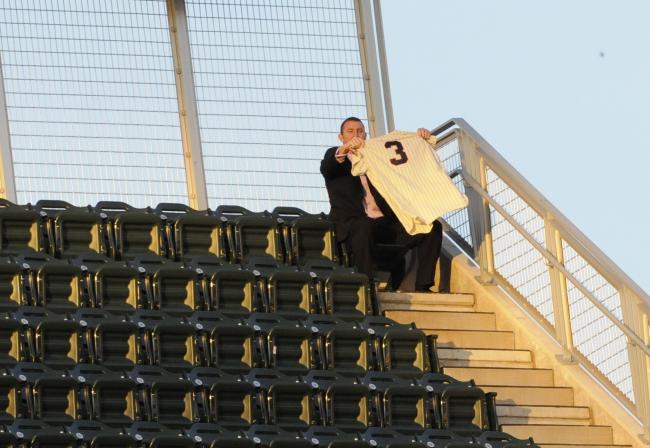Should government stay out of your smartphone; ready, set, help; why the low turnout at Killebrew’s celebration; self defense or murder; and were voters hoodwinked on Legacy Amendment?
1) SHOULD GOVERNMENT STAY OUT OF YOUR SMARTPHONE?
Should the government have access to your geolocation data that is sent out by your GPS or cellphone? Officials don’t really know how to classify this data. Is the collection of the data subject to the Fourth Amendment? Or can the government snatch it up as it pleases? Two congressmen are filing legislation to require a warrant.
“It gets at some of the core concerns that people have, that my cellphone is also a portable tracking device that can be used by law enforcement or companies or anybody that wants to know where I am,” a lobbyist for the ACLU says.
But, some proponents of tracking might argue, if you haven’t done anything wrong, what are you worried about?
Wired’s Danger Room has the details.
Last evening, Congress extended the Patriot Act. A bipartisan amendment to give Congress some oversight over how the law is being used didn’t get a vote.
2) READY, SET, HELP
For several days, many people have been asking how they can help the people off north Minneapolis, whose homes were damaged or destroyed in last Sunday’s tornado. Now we know. MPR’s Madeleine Baran has put together a great list of ways to pitch in, the physical way.
Let’s clear some debris!
People interested in volunteering to help cleanup debris in north Minneapolis should call the city’s 311 hotline. Volunteers must be at least 18 years old. Operators will take down caller information and call them back to schedule a date and time to help. Coordinators said the biggest need is for groups to volunteer together. Staffers from Twin Cities Habitat for Humanity and other nonprofits will be training volunteers at 1823 Emerson Ave. N.
MPR’s Lorna Benson reveals the timeline of the tornado and its warnings. One thing comes through: We depend too much on hearing sirens to tell us a tornado is coming. Several people in her story said they didn’t hear the warning sirens while they were in their homes. They’re not supposed to. Sirens are for people who are outside.
3) WHERE WAS EVERYBODY?
It was, by all accounts, a lovely memorial service for Twins great Harmon Killebrew at Target Field last night. Jim Thome was sitting by himself in a seat as far away from home plate as The Killer’s longest homerun traveled.

He could’ve picked a seat almost anywhere else in the park and still had plenty of elbow room; only about 4,000 people showed up at the celebration.
When the Cleveland Indians honored the face of their franchise Bob Feller, they held the ceremony before the team’s first home game. More people turned out, of course, but they gave Feller just 10 minutes.
4) SELF DEFENSE OR MURDER?
As it wrapped up the session this week, the Minnesota Legislature declined to take up the self-defense law, the bill that would have allowed Minnesotans more freedom to shoot people in self defense. Oklahoma passed what they call the “Make My Day” law in the 1980s, then extended it to the workplace and automobiles in 2006.
But there’s self defense and then there’s murder. Jerome Ersland, 59, was hailed as a hero when he shot a teenager trying to rob his pharmacy. Some still thought him a hero when he grabbed a second gun and finished the teenager off.
Yesterday, a jury said he’s no hero.
Seventy-three percent of those answering an online poll at the Daily Oklahoman disagreed. “He was a punk armed robber and got what he deserved,” one person said of the kid.
5) WERE VOTERS HOODWINKED ON LEGACY AMENDMENT?
Did people know what they were doing in 2008 when they voted to raise the state’s sales tax to pay for outdoors and cultural programs? An effort to repeal the constitutional amendment was launched yesterday.
The success of the amendment was geographical, according to this map of the election results (click image for a larger version). Southern Minnesota was heavily in favor of it, northern Minnesota wasn’t.
“I think the voters were hoodwinked,” Andy Cilek, president of the Minnesota Voters Alliance, told the Star Tribune, “Most people didn’t even know it was a tax,” he said, and were misled into believing they were simply voting to support programs for the outdoors and the arts.
Is that true? Maybe. Maybe not. Let’s look again at what the question on the ballot said…
Shall the Minnesota Constitution be amended to dedicate funding to protect our drinking water sources; to protect, enhance, and restore our wetlands, prairies, forests, and fish, game, and wildlife habitat; to preserve our arts and cultural heritage; to support our parks and trails; and to protect, enhance, and restore our lakes, rivers, streams, and groundwater by increasing the sales and use tax rate beginning July 1, 2009, by three-eighths of one percent on taxable sales until the year 2034?
Were you hoodwinked by that question?
VIRAL VIDEO OF THE DAY
COMMENCEMENT SPEECH OF THE DAY
Brit Adam price delivers his “Declaration of Independence 2.0” speech at Harvard’s graduation.
TODAY’S QUESTION
Social networks have played a major role in the so-called Arab Spring. In light of that, leaders at the G8 Summit in France are being urged to view Internet access as a basic human right. Today’s Question: Does Internet access rise to the level of a human right?
WHAT WE’RE DOING
Midmorning (9-11 a.m.) – First hour: The Internet’s role in human rights.
Second hour: The Wildlife Rehabilitation Center.
Midday (11 a.m. – 1 p.m.) – First hour: Tim Pawlenty’s presidential candidacy.
Second hour: “The Politics of Joy,” a 1988 MPR documentary about Hubert Humphrey.
Science Friday (1-3 p.m.) – First hour: Are we primed to understand geometry more than arithmetic?
Second hour: The legacy of the Apollo space program.

